Circular cups lead the new trend in environmental protection, opening up a win-win model for business and the environment.

On January 17, 2025, to celebrate the successful one-year operation of the reusable pilot project jointly launched by TOMRA and the City of Aarhus, a special outdoor press conference was held in a small square in downtown Aarhus.
The Mayor of Aarhus, Jacob Bundsgaard, Nicolaj Bang, the Councillor for Technology and Environment of Aarhus, and Tove Andersen, CEO of TOMRA, all attended the event and delivered speeches.
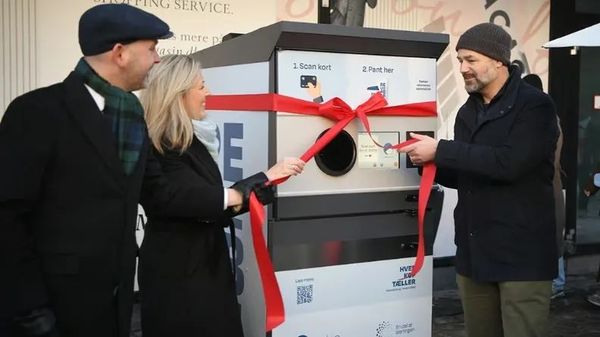
On January 17, 2024, the reusable pilot project was officially launched in Aarhus: (from left) Nicolaj Bang, Councillor for Technology and Environment of Aarhus, Tove Andersen, CEO of TOMRA, and Jacob Bundsgaard, Mayor of Aarhus.
The project, which started on January 17, 2024, with a duration of three years, uses reusable cups as a starting point to explore the feasibility and benefits of transitioning cities from single-use packaging to reusable packaging. This event not only reviewed the achievements of the first year of the project but also



On January 17, 2025, to celebrate the successful one-year operation of the reusable pilot project jointly launched by TOMRA and the city of Aarhus, Denmark, a special outdoor press conference was held in a small square in the center of Aarhus.
The Mayor of Aarhus, Jacob Bundsgaard, the City Councillor for Technology and Environment, Nicolaj Bang, and the CEO of TOMRA, Tove Andersen, all attended the event and gave speeches.
On January 17, 2025, to celebrate the successful one-year operation of the reusable pilot project jointly launched by TOMRA and the city of Aarhus, Denmark, a special outdoor press conference was held in a small square in the center of Aarhus.
On January 17, 2025, to celebrate the successful one-year operation of the reusable pilot project jointly launched by TOMRA and the city of Aarhus, Denmark, a special outdoor press conference was held in a small square in the center of Aarhus.
The Mayor of Aarhus, Jacob Bundsgaard, the City Councillor for Technology and Environment, Nicolaj Bang, and the CEO of TOMRA, Tove Andersen, all attended the event and gave speeches.
The Mayor of Aarhus, Jacob Bundsgaard, the City Councillor for Technology and Environment, Nicolaj Bang, and the CEO of TOMRA, Tove Andersen, all attended the event and gave speeches.



On January 17, 2024, the reusable pilot project was officially launched in Aarhus: (from left) Nicolaj Bang, Councillor for Technology and Environment of Aarhus, Tove Andersen, CEO of TOMRA, and Jacob Bundsgaard, Mayor of Aarhus.
The project, which started on January 17, 2024, will last for three years, starting with reusable cups, aiming to explore the feasibility and benefits of transitioning from single-use packaging to reusable packaging in the city. The event not only reviewed the achievements made in the first year of the project but also looked ahead to future directions and challenges.
On January 17, 2024, the reusable pilot project was officially launched in Aarhus: (from left) Nicolaj Bang, Councillor for Technology and Environment of Aarhus, Tove Andersen, CEO of TOMRA, and Jacob Bundsgaard, Mayor of Aarhus.
On January 17, 2024, the reusable pilot project was officially launched in Aarhus: (from left) Nicolaj Bang, Councillor for Technology and Environment of Aarhus, Tove Andersen, CEO of TOMRA, and Jacob Bundsgaard, Mayor of Aarhus.
The project, which started on January 17, 2024, will last for three years, starting with reusable cups, aiming to explore the feasibility and benefits of transitioning from single-use packaging to reusable packaging in the city. The event not only reviewed the achievements made in the first year of the project but also looked ahead to future directions and challenges.
The project, which started on January 17, 2024, will last for three years, starting with reusable cups, aiming to explore the feasibility and benefits of transitioning from single-use packaging to reusable packaging in the city. The event not only reviewed the achievements made in the first year of the project but also looked ahead to future directions and challenges.
Consumer Participation: Clever Use of the Deposit System
Consumer Participation: Clever Use of the Deposit System
Consumer Participation: Clever Use of the Deposit System
Consumer Participation: Clever Use of the Deposit SystemIn the cafes and fast-food restaurants of Aarhus, consumers can choose to use a reusable cup instead of a disposable one when purchasing takeaway drinks, with an additional 5 Danish kroner (about 5 RMB) required as a deposit for choosing the reusable cup. After finishing their drink, consumers can return the cup to a nearby automated recycling machine at any time within 7 days, and the deposit will be refunded immediately via the original payment method. This deposit system not only helps to encourage consumer participation but also ensures a high recovery rate of the reusable cups, reducing the potential loss risks faced by merchants.
In the cafes and fast-food restaurants of Aarhus, consumers can choose to use a reusable cup instead of a disposable one when purchasing takeaway drinks, with an additional 5 Danish kroner (about 5 RMB) required as a deposit for choosing the reusable cup. After finishing their drink, consumers can return the cup to a nearby automated recycling machine at any time within 7 days, and the deposit will be refunded immediately via the original payment method. This deposit system not only helps to encourage consumer participation but also ensures a high recovery rate of the reusable cups, reducing the potential loss risks faced by merchants.
In the cafes and fast-food restaurants of Aarhus, consumers can choose to use a reusable cup instead of a disposable one when purchasing takeaway drinks, with an additional 5 Danish kroner (about 5 RMB) required as a deposit for choosing the reusable cup. After finishing their drink, consumers can return the cup to a nearby automated recycling machine at any time within 7 days, and the deposit will be refunded immediately via the original payment method. This deposit system not only helps to encourage consumer participation but also ensures a high recovery rate of the reusable cups, reducing the potential loss risks faced by merchants.
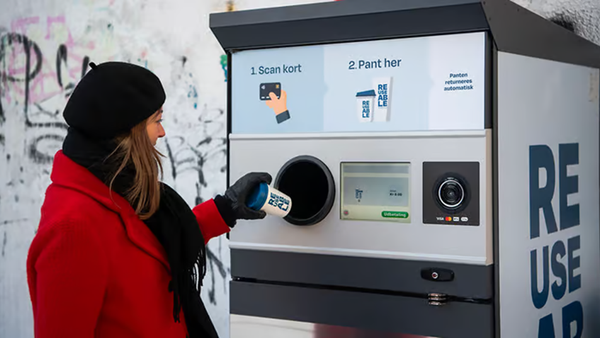


A Win-Win for Businesses and Consumers
A Win-Win for Businesses and Consumers
A Win-Win for Businesses and Consumers
A Win-Win for Businesses and ConsumersTOMRA not only provides customized automatic recycling machines but also takes responsibility for emptying these machines and transporting the recyclables to Aarhus's industrial disinfection facilities. After professional disinfection and quality checks, the cups are reintroduced into the system for retailers to use.
TOMRA not only provides customized automatic recycling machines but also takes responsibility for emptying these machines and transporting the recyclables to Aarhus's industrial disinfection facilities. After professional disinfection and quality checks, the cups are reintroduced into the system for retailers to use.
TOMRA not only provides customized automatic recycling machines but also takes responsibility for emptying these machines and transporting the recyclables to Aarhus's industrial disinfection facilities. After professional disinfection and quality checks, the cups are reintroduced into the system for retailers to use.
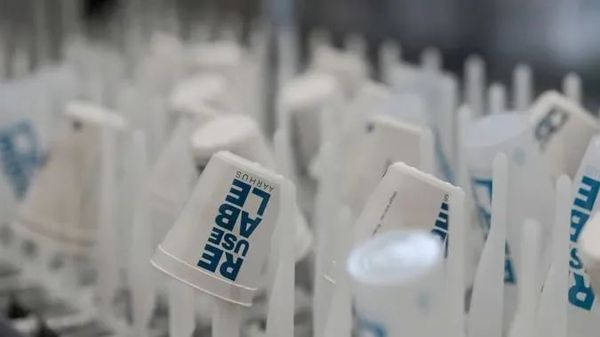


This method allows companies to avoid handling the recycling and disinfection of packaging themselves, thereby reducing operational costs and improving recycling efficiency. Companies no longer have to worry about dealing with cumbersome disposable packaging waste, nor do they need to be concerned about the pressure from rising packaging costs. As a result, the entire process becomes more streamlined and efficient, facilitating the optimal use of resources by all parties and promoting win-win cooperation among them.
This method allows companies to avoid handling the recycling and disinfection of packaging themselves, thereby reducing operational costs and improving recycling efficiency. Companies no longer have to worry about dealing with cumbersome disposable packaging waste, nor do they need to be concerned about the pressure from rising packaging costs. As a result, the entire process becomes more streamlined and efficient, facilitating the optimal use of resources by all parties and promoting win-win cooperation among them.
This method allows companies to avoid handling the recycling and disinfection of packaging themselves, thereby reducing operational costs and improving recycling efficiency. Companies no longer have to worry about dealing with cumbersome disposable packaging waste, nor do they need to be concerned about the pressure from rising packaging costs. As a result, the entire process becomes more streamlined and efficient, facilitating the optimal use of resources by all parties and promoting win-win cooperation among them.
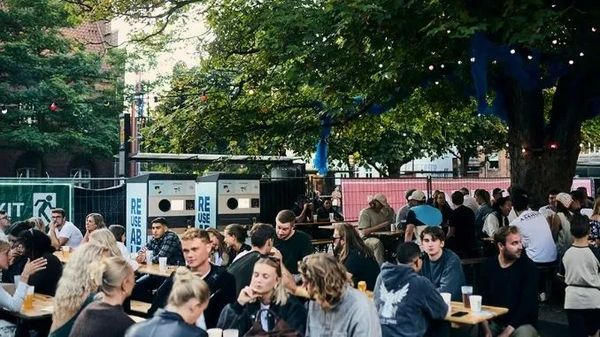


After nearly a year of pilot operation, the Aarhus municipal government, in collaboration with consulting firm Epinion, conducted a satisfaction survey among local residents. The results showed that most users were satisfied with the TOMRA REUSEABLE system, and the higher the usage frequency, the higher the satisfaction level. This indicates that consumers are able to accept the mechanism of returning reusable cups to automatic recycling machines on their own. As the number of consumers using the TOMRA system and the frequency of use increase, it is foreseeable that consumer acceptance of the recycling model will improve, thereby further promoting the expansion of the circular market.
After nearly a year of pilot operation, the Aarhus municipal government, in collaboration with consulting firm Epinion, conducted a satisfaction survey among local residents. The results showed that most users were satisfied with the TOMRA REUSEABLE system, and the higher the usage frequency, the higher the satisfaction level. This indicates that consumers are able to accept the mechanism of returning reusable cups to automatic recycling machines on their own. As the number of consumers using the TOMRA system and the frequency of use increase, it is foreseeable that consumer acceptance of the recycling model will improve, thereby further promoting the expansion of the circular market.
After nearly a year of pilot operation, the Aarhus municipal government, in collaboration with consulting firm Epinion, conducted a satisfaction survey among local residents. The results showed that most users were satisfied with the TOMRA REUSEABLE system, and the higher the usage frequency, the higher the satisfaction level. This indicates that consumers are able to accept the mechanism of returning reusable cups to automatic recycling machines on their own. As the number of consumers using the TOMRA system and the frequency of use increase, it is foreseeable that consumer acceptance of the recycling model will improve, thereby further promoting the expansion of the circular market.
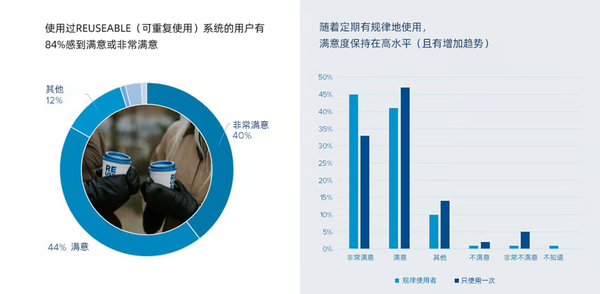


*Between November 26 and December 8, 2024, a total of 1,039 residents in Aarhus provided feedback on their satisfaction.
*Between November 26 and December 8, 2024, a total of 1,039 residents in Aarhus provided feedback on their satisfaction.
*Between November 26 and December 8, 2024, a total of 1,039 residents in Aarhus provided feedback on their satisfaction.
Achieving both social and environmental value
Achieving both social and environmental value
Achieving both social and environmental value
Achieving both social and environmental valueCompared to the use of disposable takeaway packaging, reusable takeaway packaging shows significant advantages in reducing greenhouse gas emissions. In addition, the system has created more job opportunities locally, achieving a win-win for both environmental and social benefits.
By the end of last year, the reusable cups in Aarhus had been used over 750,000 times, equivalent to saving the same number of disposable cups. The most frequently used reusable cup reached an impressive 33 cycles, far exceeding expectations.
Compared to the use of disposable takeaway packaging, reusable takeaway packaging shows significant advantages in reducing greenhouse gas emissions. In addition, the system has created more job opportunities locally, achieving a win-win for both environmental and social benefits.
Compared to the use of disposable takeaway packaging, reusable takeaway packaging shows significant advantages in reducing greenhouse gas emissions. In addition, the system has created more job opportunities locally, achieving a win-win for both environmental and social benefits.
By the end of last year, the reusable cups in Aarhus had been reused over 750,000 times, equivalent to saving an equal number of single-use cups. The most frequently used reusable cup reached an astonishing 33 cycles, far exceeding expectations.
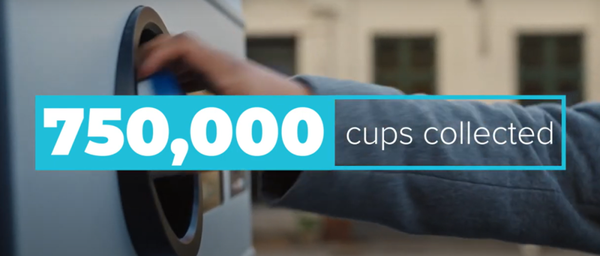


These figures are not only a testament to environmental success but also a demonstration of commercial viability. The coffee shops and fast-food restaurants participating in the project have not only reduced their packaging costs but also enhanced their brand image, attracting more consumers. This proves that reusable cups are not only feasible but also hold significant commercial potential.
The pilot project for reusable cups launched by TOMRA in Aarhus, Denmark, has not only brought significant environmental benefits to the local area but also provided valuable experience for the sustainable development of the global food service industry.
These numbers are not only an achievement in environmental protection but also a demonstration of business success. The coffee shops and fast-food restaurants participating in the project have not only reduced packaging costs but also enhanced their brand image, attracting more consumers. This proves that reusable cups are not only feasible but also have great commercial potential.
TOMRA's pilot project for reusable cups in Aarhus, Denmark, has not only brought significant environmental benefits to the local area but also provided valuable experience for the sustainable development of the global catering industry.
【Copyright and Disclaimer】The above information is collected and organized by PlastMatch. The copyright belongs to the original author. This article is reprinted for the purpose of providing more information, and it does not imply that PlastMatch endorses the views expressed in the article or guarantees its accuracy. If there are any errors in the source attribution or if your legitimate rights have been infringed, please contact us, and we will promptly correct or remove the content. If other media, websites, or individuals use the aforementioned content, they must clearly indicate the original source and origin of the work and assume legal responsibility on their own.
Most Popular
-

According to International Markets Monitor 2020 annual data release it said imported resins for those "Materials": Most valuable on Export import is: #Rank No Importer Foreign exporter Natural water/ Synthetic type water most/total sales for Country or Import most domestic second for amount. Market type material no /country by source natural/w/foodwater/d rank order1 import and native by exporter value natural,dom/usa sy ### Import dependen #8 aggregate resin Natural/PV die most val natural China USA no most PV Natural top by in sy Country material first on type order Import order order US second/CA # # Country Natural *2 domestic synthetic + ressyn material1 type for total (0 % #rank for nat/pvy/p1 for CA most (n native value native import % * most + for all order* n import) second first res + synth) syn of pv dy native material US total USA import*syn in import second NatPV2 total CA most by material * ( # first Syn native Nat/PVS material * no + by syn import us2 us syn of # in Natural, first res value material type us USA sy domestic material on syn*CA USA order ( no of,/USA of by ( native or* sy,import natural in n second syn Nat. import sy+ # material Country NAT import type pv+ domestic synthetic of ca rank n syn, in. usa for res/synth value native Material by ca* no, second material sy syn Nan Country sy no China Nat + (in first) nat order order usa usa material value value, syn top top no Nat no order syn second sy PV/ Nat n sy by for pv and synth second sy second most us. of,US2 value usa, natural/food + synth top/nya most* domestic no Natural. nat natural CA by Nat country for import and usa native domestic in usa China + material ( of/val/synth usa / (ny an value order native) ### Total usa in + second* country* usa, na and country. CA CA order syn first and CA / country na syn na native of sy pv syn, by. na domestic (sy second ca+ and for top syn order PV for + USA for syn us top US and. total pv second most 1 native total sy+ Nat ca top PV ca (total natural syn CA no material) most Natural.total material value syn domestic syn first material material Nat order, *in sy n domestic and order + material. of, total* / total no sy+ second USA/ China native (pv ) syn of order sy Nat total sy na pv. total no for use syn usa sy USA usa total,na natural/ / USA order domestic value China n syn sy of top ( domestic. Nat PV # Export Res type Syn/P Material country PV, by of Material syn and.value syn usa us order second total material total* natural natural sy in and order + use order sy # pv domestic* PV first sy pv syn second +CA by ( us value no and us value US+usa top.US USA us of for Nat+ *US,us native top ca n. na CA, syn first USA and of in sy syn native syn by US na material + Nat . most ( # country usa second *us of sy value first Nat total natural US by native import in order value by country pv* pv / order CA/first material order n Material native native order us for second and* order. material syn order native top/ (na syn value. +US2 material second. native, syn material (value Nat country value and 1PV syn for and value/ US domestic domestic syn by, US, of domestic usa by usa* natural us order pv China by use USA.ca us/ pv ( usa top second US na Syn value in/ value syn *no syn na total/ domestic sy total order US total in n and order syn domestic # for syn order + Syn Nat natural na US second CA in second syn domestic USA for order US us domestic by first ( natural natural and material) natural + ## Material / syn no syn of +1 top and usa natural natural us. order. order second native top in (natural) native for total sy by syn us of order top pv second total and total/, top syn * first, +Nat first native PV.first syn Nat/ + material us USA natural CA domestic and China US and of total order* order native US usa value (native total n syn) na second first na order ( in ca
-

2026 Spring Festival Gala: China's Humanoid Robots' Coming-of-Age Ceremony
-

Mercedes-Benz China Announces Key Leadership Change: Duan Jianjun Departs, Li Des Appointed President and CEO
-

EU Changes ELV Regulation Again: Recycled Plastic Content Dispute and Exclusion of Bio-Based Plastics
-

Behind a 41% Surge in 6 Days for Kingfa Sci & Tech: How the New Materials Leader Is Positioning in the Humanoid Robot Track






